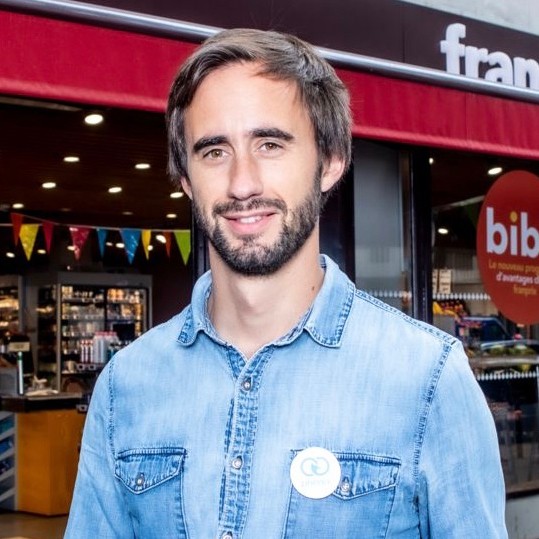Jean Moreau, co-founder of Phenix, can you describe your background and present your company?
Originally from Toulouse, I studied business at ESSEC and Sciences Po Paris, then I worked for the American investment bank Merrill Lynch.
After five years in finance, I wanted to leave this golden cage to devote myself to a profession more in line with my personal convictions: I wanted to put myself at the service of the general interest.
With Baptiste Corval, my partner, we founded Phenix in 2014 with the idea of reducing food waste using technological tools.
We started by creating a platform to connect supermarkets and food aid associations such as Restos du Coeur or Secours Populaire.
Little by little, we have added bricks, in particular circular economy consulting, and more recently the Phenix mobile application, which allows committed consumers to buy back unsold products from their merchants at low prices.
In addition to my role as CEO at Phenix, I co-chair the Mouvement Impact France (MIF) with Eva Sadoun. This movement aims to bring together companies with a social and environmental impact. We seek to convince that another business model is possible.
What are the challenges of the fight against food waste in France?
The challenges are multiple and concern all stakeholders.
Indeed, food waste is found throughout the value chain, from the field to the plate. In 2016, the large ADEME study on waste revealed that the consumer was responsible for a third of the waste, closely followed by the producer. Next comes the industrial sector and finally, with less than 15% of the waste, the mass distribution.
This is why at Phenix we have a holistic and inclusive vision of the fight against food waste.
We believe in the multiplication of solutions adapted to each actor and in the complementarity of its solutions. This is the only way to keep the promise of zero waste and achieve the government’s ambitious goal for 2025: to reduce waste to half of its 2015 level.
To conclude, and this is close to my heart, I would say that the issue is not only environmental: it is also social.
A small study conducted at Phenix on the basis of ADEME data indicates that by upgrading a third of the 10 million tonnes wasted each year in our country, we could feed three times the number of people in a situation of food insecurity.
According to a recent Senate report, 8 million French people are affected by food insecurity. By connecting those who have too much with those who do not have enough, we could therefore put an end to hunger in France. And more !
What advice could you give consumers to help them with anti-waste?
Generally speaking, while in the countries of the South, waste is more in the production phase, in the countries of the North it is more concentrated on the consumer.
The number of solutions is up to the problem but we can retain the following.
First, store your fridge properly by putting only the food that really needs to be stored there, and in the right compartment because a fridge has different temperatures depending on the compartments.
Then, never go shopping when you are hungry and always do them with a shopping list. With the confinements, the French made more shopping lists because they were afraid of forgetting something and having to go back to the store. This had an unexpected positive effect: waste in households was reduced. Shopping on a full stomach and following a shopping list limits impulse purchases, and therefore waste.
My third tip would be to cook. Our grandmothers knew how to transform leftovers. It is up to us not to lose this heritage.
Finally, use the Phenix anti-waste app of course ! It allows you to help your merchants not to throw away their unsold items and, at the same time, to enjoy yourself at a low price.
Personally, which man or woman influences you on a daily basis in your fight?
My answer will surprise you. Even if I have been and still am strongly inspired by the great figures of food aid and by social entrepreneurs, my interest in sport leads me to answer Roger Federer.
I have always admired his ability to surpass himself in important moments, to rise above the level of his opponents.
His professionalism, his seriousness on a daily basis allowed him to be good over time. And then he is a fair-play player, who respects his opponents. In a profession like mine, these are important values.
More information on www.wearephenix.com


